
As a resident of the Parque União favela in Complexo da Maré, I’ve been familiar with the informal market since an early age. Many of my neighbors make a living selling homemade meals and sweets throughout the city, and my parents would probably have the money to buy an apartment outside the favela if they had not closed their snack shop in front of the Universal Church in Botafogo to raise my brother and me.
In early January, with the economic crisis affecting my parents’ small food establishment in the favela, my brother and I decided to take action and make some extra money to go on a trip.
Every year, Rio’s City Hall holds a raffle that allows informal workers to work legally selling foods at the technical rehearsal of the city’s world-renowned samba schools. More than a thousand people registered for the right to sell in one of eighteen food stalls around the avenue that leads to the Sambadrome. Being as such, we took advantage of our entire family by entering the names of our parents, nephews, cousins, and anyone else we managed to remember.
Two days later, we woke up with the news that my mother had been the third person to be drawn, giving us the right to choose the third tent closest to the Sambadrome. We closed our restaurant to gather all the required documents together with the Xeroxed copies (IDs, proof of residence, 3×4 photos, etc.) and present them at the Urban Control Coordination Agency by 5pm on the same day.
Upon arriving at Urban Control at 2pm, we were informed by the staff that the registration process was over. Since we had not appeared there from 10-10:30am, when the distribution of the tents occurred, our place had been given to someone else. We reminded them that the results of the draw had only been published at 10am that day–how could we then appear there, with the necessary documentation, in 30 minutes?
After an hour of discussion with an employee who excused himself to bring another over, we were informed that we would be allowed to sell food, but that since all the stalls had already been taken, our spot on the avenue was, for the time being, undetermined.
Two days later, we gathered in a dark room in the basement of City Hall to hear a talk from the Sanitary Surveillance Agency and receive our identification documents to begin work. But at the end of the meeting, officials told us we were the only ones who would not get these papers.
First they said it was because our proof of residence was not valid as it had been issued over a year ago. Not believing his oversight, I told him that the “2015” he referred to was part of the barcode, and I pointed to the date of the previous month, to the laughter of his colleagues.
With no further excuses, the clerk said there was simply nothing we could do but wait. Realizing that something was wrong, I began to write down the identification badges of the employees, in case I had to file a complaint–and suddenly they turned their badges around so I wouldn’t be able to.
When we left the building, I was approached by two men offering more than R$1000 to buy our license for the tent. “Of course it’s illegal,” one of them explained, “but no one has a problem with that. It happens every year.”
We decided not to sell the tent, deciding that not only would we be doing the right thing but we would also make more money working legally. By the time of the first rehearsal, we had not received any calls about our licenses, and all attempts to contact employees were received with vague guarantees and to continue waiting.
To get an idea of the work itself, we went to the Sambadrome while the vendors were setting up their stalls. We found people working under strict supervision, but not by the laws and regulations of City Hall. Those who sold drinks inside the Sambadrome (at about four times the normal price) were forced to get their supply from an old and anxious woman, who in return took home 90% of the profit.
When the rehearsal began, I saw the stalls working and breaking almost all the regulations that were to be followed: more than six people working at the same time (the maximum number was two), selling certain cheeses that had been banned, meat hanging there and exposed, handling food while dealing with money. No food stall had a license ID and none of the inspectors were present to monitor the situation.
I realized that our efforts with the employees throughout this process had been in vain–no one there was working legally. Despite the idea that these people at the food stands are poor workers who deserve to be supported, they were not people like us in the favela: they were those who had connections, those who could pay bribes.
We tried to work legally, following the rules stipulated in the city’s laws, and we had lost to a predominantly male and high-functioning mafia.
With no options nor hope, I returned home and filed a complaint with the City Hall Ombudsman. I filed that a mafia had operated to exclude my mother and me from selling within our rights and provided relevant recordings that I had made along with photos and identification numbers. A man told me that I would receive an answer within five business days.
It has since been over a month and I’ve gotten no response. I called last week and another man told me an answer I already knew: that all I could do was wait.
Aline Galdino is a university student, studying Computer Science at the State University of Rio de Janeiro (UERJ) and resident of Complexo da Maré.



